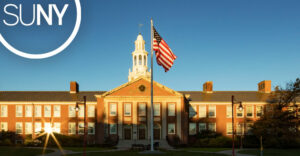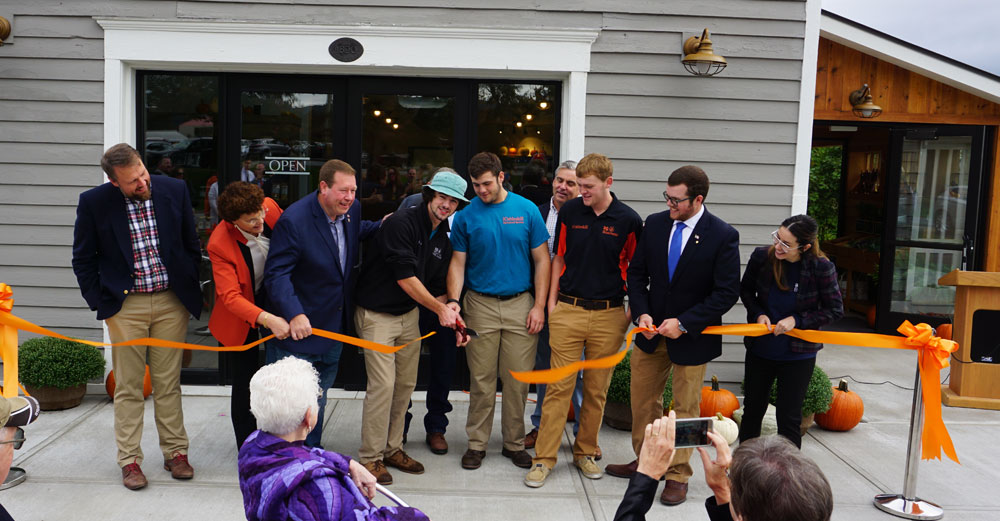
Beyond SUNY being the nation’s largest comprehensive public university system, it’s also the biggest employer for some regions, helping those communities thrive. Our students give back by volunteering with local organizations that provide assistance to residents, and our faculty spearhead programs that benefit community members. Out of our 64 campuses, SUNY Cobleskill recently received an award for their work in driving the economy and supporting their campus community.
They were awarded the 2019 Excellence and Innovation Award for Regional and Economic Development for Regional and Economic Development for their Institute for Rural Vitality, which was “created in 2016 as an extension of the College’s commitment to serve the public good.” The award is granted to institutions that “move the bar to serve their students and advance the economic and cultural development of their communities … and serve as Stewards of Place, prioritizing student success and leaving a lasting impact on their regions,” said AASCU President Dr. Mildred García.
Through Institute funding, faculty fellows and student interns have had the opportunity to better interact with the community about sustainable economic development and the enrichment of regional services, spanning from creating incubator business to providing services and programming to individuals living with Alzheimer’s disease. To date, the Institute has brought in over $6 million, which has helped to support community-based programs. The initiatives run through the Institute and the campus include but are not limited to, retail piloting and consumer research; marketing and product development for incubator clients; Alzheimer’s and dementia services; and a therapeutic horsemanship program, which also serves local veterans. Each element of these initiatives contributes to helping the campus community thrive while providing students with a plethora of experiential learning opportunities.
Bringing Generations Together to Create Health Promoting Bonds
In particular, the “Generations Together” initiative is an “innovative, intergenerational social day program developed to enhance the lives of senior citizens, preschoolers, and college students,” according to Senior Fellow Dr. Gail Wentworth who oversees the program. The goal of the program is to lessen the loneliness and stress of older adults with dementia and those who care for them by fostering social interaction through the promotion of inclusion, empathy, and a sense of community. Highlighting New York’s propensity for creating fruitful collaborations, the idea for the project began when a representative from Albany Medical Center’s Center for Excellence for Alzheimer’s Disease contacted the Institute looking for a partner for caregiver respite, which led them to Dr. Wentworth. From there, other agencies were involved in the planning process, as well as college students and the local Alzheimer’s Association caregivers support group.
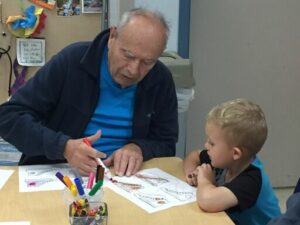
Currently, all interactions take place at the Child Care Center at SUNY Cobleskill, as well as taking trips to the playground and an outdoor parking lot for equine visits. Future plans include on-campus field trips to the greenhouses, animal barns, the art gallery, and other stops. Given the campus involvement with “Generations Together,” students are a major part of its success. Dr. Wentworth shares that any student from any major can participate in the program, although Animal Science and Early Childhood Development students have expressed the most interest. In fact, a number of students helped plan and implement the program, and all participants indicated they experienced personal and professional growth, and came away with a new understanding of dementia-related illnesses. Individuals living with dementia or Alzheimer’s experienced improvements through participating in the program as well. They showed positive cognitive and mental health outcomes such as positive mood/affect and sticking with a challenging task that required manual dexterity and concentration, and providing a well needed break for caregivers. Looking forward, Dr. Wentworth hopes to bring the program to scale in conjunction with the local research hospital, which will provide more opportunities to train the next generation of medical professionals working with dementia and Alzheimer’s patients.
Therapy Animals Helping Veterans Living with Disabilities
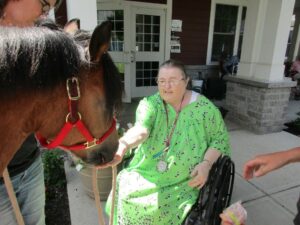
SUNY Cobleskill also has a therapeutic horsemanship program that helps people with disabilities improve listening skills, focus, and develop patience, among other things. The program was created in conjunction with SUNY Cobleskill’s Therapeutic Horsemanship major, the first of its kind throughout SUNY. At SUNY Cobleskill’s facility, the students teach children and adults aged 3-80 with disabilities to ride horses. Emma Paden, and Institute Fellow for the Center for Community Advancement, notes that her involvement with the Institute helps to take the school’s pony Fuji and the therapeutic horsemanship major “on the road” to local agencies and partner organizations, and one of the program’s biggest partners is a local nursing home in Stamford, NY. When working with older populations, Emma notes that they teach many topics about the horse, such as healthy eating, social interactions, and empathy, while allowing people to groom and interact with Fuji as well. During the winter months, they are able to take Fuji inside.
Emma shares that being able to bring Fuji to local organizations “allows people to interact with such an amazing animal.” Because some people may never be able to come in such close contact to a horse, this program “brings the outside in,” and provides people with therapeutic sensory inputs. For some seniors, it may bring back positive memories from childhood and drive individuals who normally do not participate in other group activities are to be active and engaged when the pony visits. In addition to working with individuals with disabilities, the program also serves veterans. Marny Mansfield, who is Head of the Therapeutic Horsemanship programming and coordinates the programming with veterans, shares that SUNY Cobleskill has been providing services for veterans as of February 2018. She notes that they initially started working on campus with this population, and have since expanded to working with the Albany Stratton VA Hospital, who brings about 12 veterans a week to participate in ground-based Equine Assisted Activities.
Similar to the dementia and Alzheimer’s program, the therapeutic horsemanship program is driven by students–they are involved in planning, coordinating, and providing the on-site programming. Students are also asked to create age-appropriate equine activities and follow-up surveys to assess the success of a specific visit, keeping them involved in every step of the evaluation process. They also have the choice to participate with special projects ranging from horse management and conditioning and exercise to grant writing and program accreditation. These experiences, in addition to providing students with opportunities to interact with the local community and understand how to work with horses, will set them up for success should they choose to start their own therapeutic horsemanship program. Marny shares that many students involved with this program have been sought after for both internship and placement positions, and others choose to pursue graduate school.
Creating Small Business Connections to Spur Economic Gains
Another element of the Institute that provides students with hands-on research experience is through the work that Jason Evans does through his Executive Director role of the Institute. Through the campus’s Carriage House Cafe & General Store, small-scale food producers can launch their products, which are available to students, faculty, staff, and community members. From there, students conduct market research for clients, with a special focus on customer perceptions of their product and price point. These partnerships are mutually beneficial, as incubator clients can participate in a number of educational and workshop opportunities to better their products, and in turn, students learn how to compile research to make recommendations to clients.
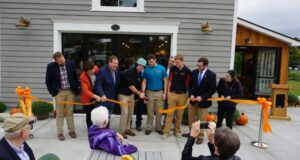
These partnerships between SUNY Cobleskill and local businesses help the community at large to offer a number of different services that will improve entrepreneurial opportunities, provide resources for partner agencies to expand their work, and improve residents’ overall quality of life through increased access to arts and cultural amenities, as well as the intellectual resources found at SUNY Cobleskill. Moving forward, Jason hopes to expand the number of businesses and students participating in this work. Through these efforts, Jason also wants Schoharie and Mohawk Valley Counties to be realized as a destination for farm and food tourism, as well as a vibrant regional food economy.
As SUNY Cobleskill President Marion A. Terenzio noted, “Higher education rural-serving institutions have a unique opportunity and obligation to be Stewards of Place,” and the Institute at SUNY Cobleskill and the campus’s other endeavors are certainly fulfilling this role through its various programs, partnerships, and product outputs. Through collaborations and student-led initiatives, the SUNY Cobleskill continues to highlight how well-ingrained SUNY is in our statewide economy, and how we are dedicated to serving our fellow New Yorkers now and for years to come.



